-
Helicopters emulate humpback whales to become more maneuverable
Humpback whales are renowned for their great speed and acrobatic skills; they achieve both because of their unusually large pectoral fins, which have characteristic bumps along the front edge; researcher say that placing similar bumps on helicopter rotor blades (the technical term is “leading-edge vortex generators”) will increase the speed and maneuverability of helicopters
-
-
Invaders wreak havoc on U.S. ecosystems
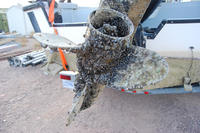
In the decade since the 9/11 attacks, DHS’ focus on combatting terrorism has left some of its core agencies ill-equipped to perform its other missions, namely the Customs and Border Protection’s (CBP) ability to prevent invasive plants and insects from entering the United States and wreaking havoc on crops
-
-
Portable device quickly detects pathogens in developing countries
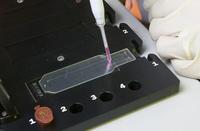
Two Cornell University researchers will combine their inventions to develop a handheld pathogen detector that will give health care workers in the developing world speedy results to identify in the field such pathogens as tuberculosis, chlamydia, gonorrhea, and HIV
-
-
Day of human-elements technology nears
Human-element research looks into biometrics, brain/computer interface and interaction, and human language technology; the U.S. military encourages government agencies, academic institutions, and commercial organizations to collaborate in this research
-
-
Self-guided bullet can hit target a mile away
Researchers have designed a self-guided bullet; the dart-like, self-guided bullet for small-caliber, smooth-bore firearms that hit laser-designated targets at distances of more than a mile
-
-
Pepco buys solar competition prize-winning building for display
WaterShed, a prize-winning, energy-saving house designed by a team from the University of Maryland, has been bought by Pepco; the utility will maintain the building and open ot for public display
-
-
Europe crops damaged by pollution crossing oceans, continents
Pollution originating from North America is responsible for a 1.2 million ton annual loss of wheat in Europe; this is the biggest intercontinental ozone pollution-related impact on any food crop
-
-
How wings really lift
A wing lifts when the air pressure above it is lowered. The explanation typically offered in high school and college physics courses is that this happens because the airflow moving over the top, curved surface has a longer distance to travel and needs to go faster to have the same transit time as the air travelling along the lower, flat surface. This is the wrong explanation, and a 1-minute video released by the University of Cambridge sets the record straight on this much misunderstood concept — how wings lift
-
-
Preparing for the end of the world as we know it
In a growing trend, more and more Americans across the United States are preparing themselves for a catastrophic apocalypse; for reasons ranging from terrorists to natural disasters or an economic meltdown, these individuals have begun stockpiling food, taking survival courses, or constructing safe rooms
-
-
Wetlands capture more carbon than earlier thought
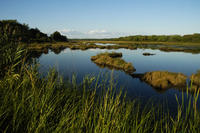
New study shows that wetlands in temperate regions are more valuable as carbon sinks than current policies imply; the study found that the stagnant wetland had an average carbon storage rate per year that is almost twice as high as the carbon storage rate of the flow-through wetland
-
-
Students compete in zero-gravity robotic competition
Two hundred high school students were on the campus of Massachusetts Institute of Technology (MIT) on Monday for a competition to program miniature satellites aboard the International Space Station
-
-
First responders could be zipping through skies within two years
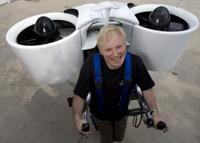
Glenn Martin, the inventor of the Martin Jetpack, the world’s first commercially available jetpack, recently spoke with Homeland Security NewsWire’s executive editor Eugene K. Chow; in their interview Martin discusses the technical challenges of developing a viable jetpack, its uses in emergency response, and when we can expect to see civilians zipping through the skies
-
-
World’s first magnetic soap can clean oil spills
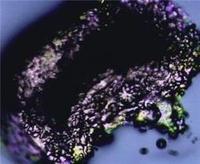
A University of Bristol team has dissolved iron in liquid surfactant to create a soap that can be controlled by magnets; the discovery could be used to create cleaning products that can be removed after application and used in the recovery of oil spills at sea
-
-
Shrew whiskers inspire robot design
The Etruscan shrew is nocturnal, relying on its whiskers to find, track, and capture its prey; the efficiency of this tiny creature has inspired scientists to look at ways of replicating the shrew’s whiskers to enable robots to find their way around without the use of vision
-
-
Mysterious flotsam in Gulf came from Deepwater Horizon rig
Scientists track debris from damaged oil rigs, helping forecast coastal impacts in the future
-
More headlines
The long view
Autonomous Vehicle Technology Vulnerable to Road Object Spoofing and Vanishing Attacks
Researchers have demonstrated the potentially hazardous vulnerabilities associated with the technology called LiDAR, or Light Detection and Ranging, many autonomous vehicles use to navigate streets, roads and highways. The researchers have shown how to use lasers to fool LiDAR into “seeing” objects that are not present and missing those that are – deficiencies that can cause unwarranted and unsafe braking or collisions.
Tantalizing Method to Study Cyberdeterrence
Tantalus is unlike most war games because it is experimental instead of experiential — the immersive game differs by overlapping scientific rigor and quantitative assessment methods with the experimental sciences, and experimental war gaming provides insightful data for real-world cyberattacks.
Prototype Self-Service Screening System Unveiled
TSA and DHS S&T unveiled a prototype checkpoint technology, the self-service screening system, at Harry Reid International Airport (LAS) in Las Vegas, NV. The aim is to provide a near self-sufficient passenger screening process while enabling passengers to directly receive on-person alarm information and allow for the passenger self-resolution of those alarms.
Falling Space Debris: How High Is the Risk I'll Get Hit?
An International Space Station battery fell back to Earth and, luckily, splashed down harmlessly in the Atlantic. Should we have worried? Space debris reenters our atmosphere every week.
Testing Cutting-Edge Counter-Drone Technology
Drones have many positive applications, bad actors can use them for nefarious purposes. Two recent field demonstrations brought government, academia, and industry together to evaluate innovative counter-unmanned aircraft systems.
Strengthening the Grid’s ‘Backbone’ with Hydropower
Argonne-led studies investigate how hydropower could help add more clean energy to the grid, how it generates value as grids add more renewable energy, and how liner technology can improve hydropower efficiency.
